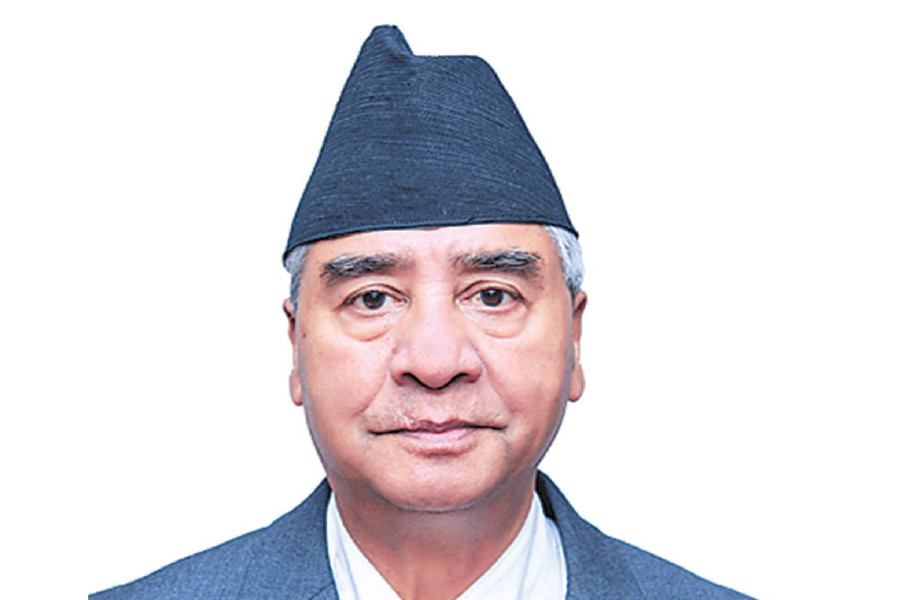Politics
Congress-UML coalition not working to weaken other parties: Deuba
General Secretary Thapa says flaws in the constitution will be corrected through amendments.
Post Report
Nepali Congress President Sher Bahadur Deuba has said that the CPN-UML-led coalition government that involves his party has no intention of weakening other parties.
This government was not formed with a plan to weaken other parties, Deuba said, addressing a function at the party office on Thursday. “I urge leaders from other parties not to have fears that the two big parties will bulldoze them.”
Ever since the formation of the Congress-UML government in July, some leaders from the CPN (Maoist Centre), the Rastriya Swatantra Party and other outfits have suspected that the two largest parties are planning to crack down on the smaller parties by imposing new provisions through electoral laws.
They accuse the Congress-UML coalition of trying to go against the spirit of pluralism, as some ruling party leaders also argue that political stability could not be achieved due to the mushrooming of smaller parties and their unreasonable bargaining while forming governments—at the centre as well as in the provinces.
“We the Nepali Congress and the UML have no policy of weakening another party,” Deuba said, felicitating the best performers from the Congress in local governments. “We want to collaborate with all political parties.”
The Congress and the UML leaders have announced that they would make some amendments to the constitution and electoral laws to ensure political stability in the country. Leaders from some fringe parties have fears that the two largest parties may increase the threshold for political forces to become a national party and to qualify for seats under the proportional representation (PR) category of election. Under the existing electoral laws, those who secure at least three percent of total valid votes in the federal parliament and 1.5 percent in the provinces qualify for seats under the PR category.
Congress and UML leaders say there is a need to raise the threshold bar to control the number of fringe parties, arguing that such a move would help ensure political stability in the country.
“Our friends were scared when the UML and the Maoists got together to form the government. Then I spoke with Oli ji and we reached a consensus. As per my agreement with Oli ji, we formed the government. Now, he is leading it. When time comes, he will hand over the responsibility,” said Deuba.
The five-time prime minister urged the party colleagues to make the Congress party stronger, reminding them that he was on the verge of retirement. “Now new leaders should worry about the future of the party and the country.”
Stating that the Congress was building momentum across the country, Deuba went on to say that even those who had left the party in the past were coming back to it.
“We and the UML reached an agreement and formed the government. When the UML and the Maoists were coalition partners, our friends were worried about our party’s future,” he said. “Therefore, we reached an agreement with the UML. After two years, for one-and-a-half years, Oli ji will hand over the baton to me.”
The party honoured 21 mayors of municipalities and chairpersons of rural municipalities elected from the party for their performance.
On the occasion, General Secretary Gagan Thapa said that the Congress should prepare for the by-elections to be held in several local units. As many as 34 local governments are without their chiefs or deputy chiefs. Of them, 21 were Congress supporters, Thapa said. “We have to retain those positions and should win other seats as well,” he said.
Thapa said that a review of the constitution is on the cards. That is why the seven-point agreement signed ahead of the government formation accorded constitution amendment the top priority.
“Through an amendment to the constitution, we have to strengthen federalism, inclusiveness, republicanism and proportional representation,” Thapa said. “We have to review the statute and correct the mistakes made while writing the constitution.”
“By the end of 2027, we should complete the legislation related to federalism and set up the necessary structure for its full-fledged implementation,” Thapa added.
“Through constitutional amendments, we want to make democracy and proportional representation function better,” he clarified.




 18.12°C Kathmandu
18.12°C Kathmandu














